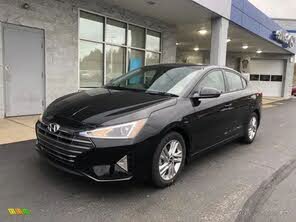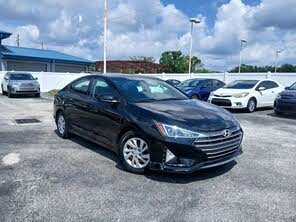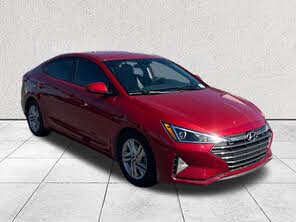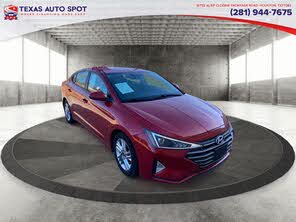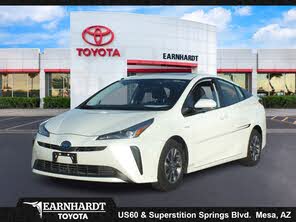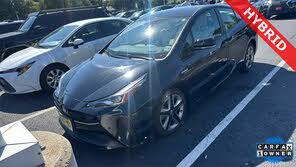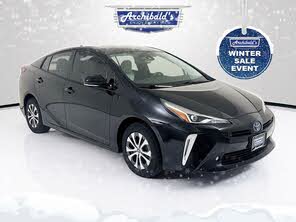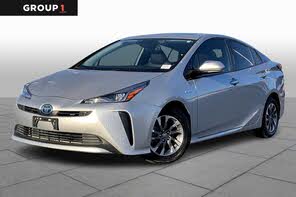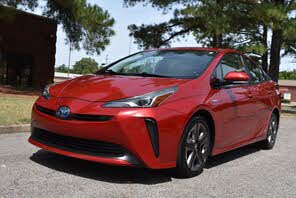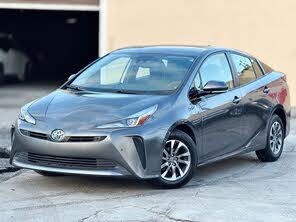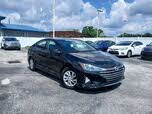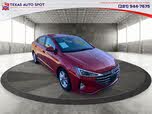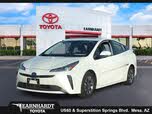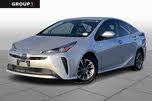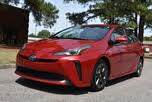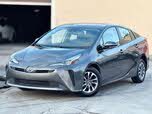2020 Hyundai Elantra vs 2019 Toyota Prius
Overview | |
MSRP$23,770 | MSRP$19,300 |
Listings215 | Listings1052 |
Ratings & Reviews | |
User Reviews | User Reviews |
Expert reviews7.3 out of 10 | Expert reviews8.3 out of 10 |
Pros
Cons
| Pros
Cons
|
2019 Toyota Prius Reviews SummaryReliable, efficient, affordable, practical, and safe, the 2019 Toyota Prius checks off multiple boxes on a typical car shopper’s list. The latest version is even decent to drive, but the Prius' styling does the car no favors. For 2019, Toyota tries to tone down the design, revises its trim-level strategy, and adds a new electric all-wheel-drive option to the car. | |
2020 Hyundai Elantra Reviews SummaryHyundai isn’t pulling any punches when it comes to the compact car segment, where value is of utmost importance. And though a completely redesigned 2021 Elantra is coming soon, the automaker bestows several value-enhancing improvements upon the outgoing 2020 Hyundai Elantra compact sedan. They include free scheduled maintenance, improved fuel economy ratings, and new standard safety features. | |
No video found | |
Popular Features & Specs | |
Engine1.8L 121 hp I4 Hybrid | Engine2.0L 147 hp I4 |
Drive TrainFWD | Drive TrainFWD |
Seating Capacity5 | Seating Capacity5 |
Horsepower | Horsepower147 hp @ 6200 rpm |
EV Battery Capacity0.7 kWh | EV Battery Capacity |
MPG City58 | MPG City31 |
MPG Highway53 | MPG Highway41 |
Engine | |
Engine Name1.8L 121 hp I4 Hybrid | Engine Name2.0L 147 hp I4 |
Torque | Torque132 lb-ft @ 4500 rpm |
Horsepower | Horsepower147 hp @ 6200 rpm |
DrivetrainFWD | DrivetrainFWD |
Fuel Economy | |
EV Battery Capacity0.7 kWh | EV Battery Capacity |
MPG City58 | MPG City31 |
MPG Highway53 | MPG Highway41 |
Interior | |
Seating Capacity5 | Seating Capacity5 |
Safety | |
Front Crash Overall4 | Front Crash Overall4 |
Side Crash Overall5 | Side Crash Overall4 |
Dimensions & Capacity | |
Cargo Space27.4 cu ft | Cargo Space14.4 cu ft |
Curb Weight3010 lbs | Curb Weight2844 lbs |
Height57.9 in | Height56.5 in |
Length180.0 in | Length181.9 in |
Width69.3 in | Width70.9 in |
Wheelbase106.3 in | Wheelbase106.3 in |
Maximum Payload825 lbs | Maximum Payload1080 lbs |
Number of doors4 | Number of doors4 |
Overview | ||
MSRP | $23,770 | $19,300 |
Listings | ||
Ratings & Reviews | ||
User reviews | ||
Expert reviews | 7.3 out of 10Read full review | 8.3 out of 10Read full review |
Pros & cons | Pros
Cons
| Pros
Cons
|
Summary | Reliable, efficient, affordable, practical, and safe, the 2019 Toyota Prius checks off multiple boxes on a typical car shopper’s list. The latest version is even decent to drive, but the Prius' styling does the car no favors. For 2019, Toyota tries to tone down the design, revises its trim-level strategy, and adds a new electric all-wheel-drive option to the car. | Hyundai isn’t pulling any punches when it comes to the compact car segment, where value is of utmost importance. And though a completely redesigned 2021 Elantra is coming soon, the automaker bestows several value-enhancing improvements upon the outgoing 2020 Hyundai Elantra compact sedan. They include free scheduled maintenance, improved fuel economy ratings, and new standard safety features. |
Video | No video found | |
Popular Features & Specs | ||
Engine | 1.8L 121 hp I4 Hybrid | 2.0L 147 hp I4 |
Drive Train | FWD | FWD |
Seating Capacity | 5 | 5 |
Horsepower | 147 hp @ 6200 rpm | |
EV Battery Capacity | 0.7 kWh | |
MPG City | 58 | 31 |
MPG Highway | 53 | 41 |
Engine | ||
Engine Name | 1.8L 121 hp I4 Hybrid | 2.0L 147 hp I4 |
Torque | 132 lb-ft @ 4500 rpm | |
Horsepower | 147 hp @ 6200 rpm | |
Drivetrain | FWD | FWD |
Fuel Economy | ||
EV Battery Capacity | 0.7 kWh | |
MPG City | 58 | 31 |
MPG Highway | 53 | 41 |
Interior | ||
Seating Capacity | 5 | 5 |
Safety | ||
Front Crash Overall | 4 | 4 |
Side Crash Overall | 5 | 4 |
Dimensions & Capacity | ||
Cargo Space | 27.4 cu ft | 14.4 cu ft |
Curb Weight | 3010 lbs | 2844 lbs |
Height | 57.9 in | 56.5 in |
Length | 180.0 in | 181.9 in |
Width | 69.3 in | 70.9 in |
Wheelbase | 106.3 in | 106.3 in |
Maximum Payload | 825 lbs | 1080 lbs |
Number of doors | 4 | 4 |
The 2019 Toyota Prius was not typically praised for its aesthetics, with its design often seen as more functional than attractive. The fourth-generation Prius, introduced in 2016, continued this trend with an even more extroverted design that some argued might have hindered its sales. Despite its unconventional looks, the Prius offered a practical solution for those seeking a reliable daily driver. The 2019 model came in various trims, including the L Eco, LE, XLE, and Limited, with prices starting at $23,770, excluding destination charges and optional all-wheel-drive costs. The interior of the Prius was equally unique, with centralized controls and a glossy black trim that attracted dust, though it functioned well once drivers acclimated to its layout.
In contrast, the 2020 Hyundai Elantra maintained its bold styling from the previous year, featuring a geometric-influenced design that set the stage for the upcoming 2021 model. Available in six trims, including the SE, SEL, Value Edition, Eco, Limited, and Sport, the Elantra's pricing ranged from $19,300 to $24,150. The Limited trim, tested with the Ultimate Package, showcased a sleek black paint job that highlighted its angular design elements. Inside, the Elantra's interior was updated to offer a more upscale appearance, with silver trim accents and a mix of materials that reminded occupants of its compact car status. The Elantra's design was generally well-received, though it might not have appealed to everyone.











The 2019 Toyota Prius combined a 1.8-liter 4-cylinder gasoline engine with an electric motor to produce 121 horsepower. The optional AWD-e system added a 5-kilowatt rear electric motor and a nickel-metal hydride battery, powering the rear wheels up to 43 mph when needed. This system reduced fuel economy slightly, with the AWD-e achieving 50 mpg compared to the standard Prius's 52 mpg. The Prius featured a CVT, which, while functional, required some adjustment due to its unique dashboard-mounted controls. Built on Toyota's global architecture, the Prius offered a pleasant driving experience with decent handling and a quiet ride, especially in urban settings. The car's EV mode allowed for electric-only driving at low speeds, and its regenerative braking system helped recharge the battery.
The 2020 Hyundai Elantra came with a base 147-horsepower, 2.0-liter four-cylinder engine paired with a new CVT, replacing the previous six-speed automatic. The Elantra Eco model featured a turbocharged 1.4-liter engine with 128 horsepower and a seven-speed DCT, achieving 36 mpg in combined driving. The Elantra Sport trim offered a 1.6-liter turbo engine with 201 horsepower and an independent rear suspension for improved handling. The Limited trim, tested with the new CVT, provided a smooth driving experience with simulated gear shifts. However, real-world fuel economy fell short of expectations, averaging 29.3 mpg. The Elantra's torsion beam axle rear suspension detracted from ride quality, though the Sport model's independent suspension offered a more enjoyable drive.
The 2019 Toyota Prius offered a surprisingly roomy interior, comfortably seating four adults. The driver's seat featured manual height adjustment, while the front passenger seat sat high off the floor. Rear passengers enjoyed decent legroom and thigh support, though air conditioning vents were absent. The Prius's hatchback design provided ample cargo space, with up to 27.4 cubic feet behind the rear seats and 65.5 cubic feet with the seats folded down. However, the SofTex leatherette upholstery in higher trims could become uncomfortable in hot weather.
The 2020 Hyundai Elantra was also spacious for a compact car, accommodating four adults comfortably. The Limited trim included power driver's seat adjustment, leather upholstery, and a sliding center console armrest. All Elantras featured a front passenger seat-height adjuster and a dual-zone automatic climate control system. Interior storage was adequate, and the trunk offered 14.4 cubic feet of space, comparable to some midsize sedans. The Elantra's interior design was practical and user-friendly, with thoughtful touches like an interior grab handle for the trunk lid.
The 2019 Toyota Prius's most advanced infotainment system was reserved for the Limited trim, featuring an 11.6-inch touchscreen, navigation, and a premium JBL sound system. The XLE AWD-e test car had a standard 6.1-inch touchscreen with Bluetooth and a CD player, blending seamlessly into the interior. The Prius's instrumentation was housed in a horizontal strip below the windshield, with some displays appearing outdated. The Advanced Technology Package included a head-up display and adaptive headlights but lacked Apple CarPlay and Android Auto.
The 2020 Hyundai Elantra came with a standard touchscreen infotainment system, with screen sizes varying by trim. The SEL trim included a 7-inch display with Apple CarPlay, Android Auto, and SiriusXM satellite radio. The Limited trim added wireless smartphone charging and a premium Infinity sound system. The Ultimate Package increased the touchscreen size to 8 inches and added navigation and Blue Link services. The Elantra's infotainment system was user-friendly, with shortcut buttons and a responsive voice recognition system.
The 2019 Toyota Prius offered standard Toyota Safety Sense, including adaptive cruise control, forward-collision warning, automatic emergency braking, lane-departure warning, lane-keeping assist, and automatic high-beam headlights. The LE trim added blind-spot monitoring and rear cross-traffic alert. The Prius received a 5-star rating from the NHTSA and a Top Safety Pick from the IIHS, though some frontal impact ratings were slightly lower.
The 2020 Hyundai Elantra featured standard Smart Sense, with forward-collision warning, automatic emergency braking, lane departure warning, lane-keeping assist, and a driver attention monitor. Higher trims added blind-spot warning, rear cross-traffic alert, and LED headlights. The Ultimate Package included adaptive cruise control and pedestrian detection. The Elantra earned a Top Safety Pick from the IIHS and a 4-star rating from the NHTSA, with some concerns about rear-door intrusion in side-impact tests.
CarGurus highlights

According to CarGurus experts, the overall rating for the 2019 Toyota Prius is 7.3 out of 10, while the 2020 Hyundai Elantra scores 8.3 out of 10. Based on these ratings, the 2020 Hyundai Elantra is the recommended choice, offering a better balance of style, technology, and safety features.
Choose the 2020 Hyundai Elantra if:
- You prefer a more traditional and user-friendly infotainment system.
- You want a compact car with a spacious interior and thoughtful design touches.
- You seek a vehicle with a comprehensive suite of safety features and a stylish exterior.
Choose the 2019 Toyota Prius if:
- You prioritize fuel efficiency and a quiet ride in urban settings.
- You need ample cargo space comparable to small SUVs.
- You value a unique design and are comfortable with its unconventional controls.
CarGurus highlights

According to CarGurus experts, the overall rating for the 2019 Toyota Prius is 7.3 out of 10, while the 2020 Hyundai Elantra scores 8.3 out of 10. Based on these ratings, the 2020 Hyundai Elantra is the recommended choice, offering a better balance of style, technology, and safety features.
Choose the 2020 Hyundai Elantra if:
Shop Now- You prefer a more traditional and user-friendly infotainment system.
- You want a compact car with a spacious interior and thoughtful design touches.
- You seek a vehicle with a comprehensive suite of safety features and a stylish exterior.
Choose the 2019 Toyota Prius if:
Shop Now- You prioritize fuel efficiency and a quiet ride in urban settings.
- You need ample cargo space comparable to small SUVs.
- You value a unique design and are comfortable with its unconventional controls.

By: CarGurus + AI
At CarGurus, our team of experienced automotive writers remain at the heart of our content operation, conducting hands-on car tests and writing insightful guides that are backed by years of industry experience. To complement this, we are harnessing AI to make our content offering more diverse and more helpful to shoppers than ever. To achieve this, our AI systems are based exclusively on CarGurus content, ratings and data, so that what we produce is both unique to CarGurus, and uniquely helpful to car shoppers.

